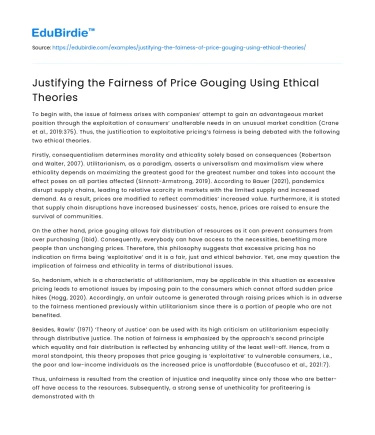To begin with, the issue of fairness arises with companies’ attempt to gain an advantageous market position through the exploitation of consumers’ unalterable needs in an unusual market condition (Crane et al., 2019:375). Thus, the justification to exploitative pricing’s fairness is being debated with the following two ethical theories.
Firstly, consequentialism determines morality and ethicality solely based on consequences (Robertson and Walter, 2007). Utilitarianism, as a paradigm, asserts a universalism and maximalism view where ethicality depends on maximizing the greatest good for the greatest number and takes into account the effect poses on all parties affected (Sinnott-Armstrong, 2019). According to Bauer (2021), pandemics disrupt supply chains, leading to relative scarcity in markets with the limited supply and increased demand. As a result, prices are modified to reflect commodities’ increased value. Furthermore, it is stated that supply chain disruptions have increased businesses’ costs, hence, prices are raised to ensure the survival of communities.
Save your time!
We can take care of your essay
- Proper editing and formatting
- Free revision, title page, and bibliography
- Flexible prices and money-back guarantee
On the other hand, price gouging allows fair distribution of resources as it can prevent consumers from over purchasing (ibid). Consequently, everybody can have access to the necessities, benefiting more people than unchanging prices. Therefore, this philosophy suggests that excessive pricing has no indication on firms being ‘exploitative’ and it is a fair, just and ethical behavior. Yet, one may question the implication of fairness and ethicality in terms of distributional issues.
So, hedonism, which is a characteristic of utilitarianism, may be applicable in this situation as excessive pricing leads to emotional issues by imposing pain to the consumers which cannot afford sudden price hikes (Hogg, 2020). Accordingly, an unfair outcome is generated through raising prices which is in adverse to the fairness mentioned previously within utilitarianism since there is a portion of people who are not benefited.
Besides, Rawls’ (1971) ‘Theory of Justice’ can be used with its high criticism on utilitarianism especially through distributive justice. The notion of fairness is emphasized by the approach’s second principle which equality and fair distribution is reflected by enhancing utility of the least well-off. Hence, from a moral standpoint, this theory proposes that price gouging is ‘exploitative’ to vulnerable consumers, i.e., the poor and low-income individuals as the increased price is unaffordable (Buccafusco et al., 2021:7).
Thus, unfairness is resulted from the creation of injustice and inequality since only those who are better-off have access to the resources. Subsequently, a strong sense of unethicality for profiteering is demonstrated with the unfair and unreasonable price inhibited on goods and services.






 Stuck on your essay?
Stuck on your essay?

